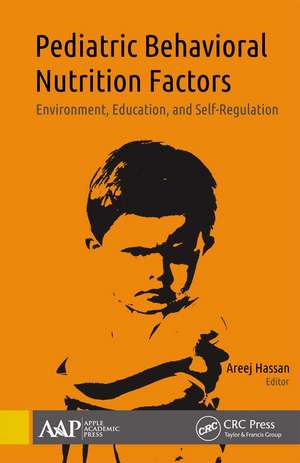Pediatric Behavioral Nutrition Factors: Environment, Education, and Self-Regulation
Editat de Areej Hassanen Limba Engleză Paperback – 31 mar 2021
Preț: 495.13 lei
Preț vechi: 637.68 lei
-22% Nou
Puncte Express: 743
Preț estimativ în valută:
94.82€ • 96.76$ • 79.78£
94.82€ • 96.76$ • 79.78£
Carte tipărită la comandă
Livrare economică 26 februarie-12 martie
Preluare comenzi: 021 569.72.76
Specificații
ISBN-13: 9781774636862
ISBN-10: 1774636867
Pagini: 358
Ilustrații: 14
Dimensiuni: 152 x 229 mm
Greutate: 0.66 kg
Ediția:1
Editura: Apple Academic Press Inc.
Colecția Apple Academic Press
ISBN-10: 1774636867
Pagini: 358
Ilustrații: 14
Dimensiuni: 152 x 229 mm
Greutate: 0.66 kg
Ediția:1
Editura: Apple Academic Press Inc.
Colecția Apple Academic Press
Public țintă
Academic and PostgraduateCuprins
Determinants of Dietary Behavior Among Youth: An Umbrella Review. Dietary Intake of Children Participating in the USDA Summer Food Service Program. Parental Feeding Practices and Child Weight Status in Mexican American Families: A Longitudinal Analysis. Development of the General Parenting Observational Scale to Assess Parenting During Family Meals. Mealtime Behavior Among Siblings and Body Mass Index of 4–8 Year Olds: A Videotaped Observational Study. Frequency and Socio-Demographic Correlates of Eating Meals Out and Take-Away Meals at Home: Cross-Sectional Analysis of the UK National Diet and Nutrition Survey, Waves 1–4 (2008–12). Feeding Practices of Low-Income Mothers: How Do They Compare to Current Recommendations? Overweight Among Students Aged 11–15 Years and Its Relationship with Breakfast, Area of Residence and Parents’ Education: Results from the Italian HBSC 2010 Cross-Sectional Study. Maternal Educational Level and Children’s Healthy Eating Behaviour: Role of the Home Food Environment (Cross-Sectional Results from the INPACT Study). A Pilot Study of a Pictorial Bilingual Nutrition Education Game to Improve the Consumption of Healthful Foods in a Head Start Population. Blending Better Beverage Options: A Nutrition Education and Experiential Workshop for Youths. Self-Regulation and the Management of Childhood Obesity. Weight Self-Regulation Process in Adolescence: The Relationship Between Control Weight Attitudes, Behaviors, and Body Weight Status. The Role of Self-Regulating Abilities in Long-Term Weight Loss in Severely Obese Children and Adolescents Undergoing Intensive Combined Lifestyle Interventions (HELIOS); Rationale, Design and Methods. Enhancing Self-Regulation as a Strategy for Obesity Prevention in Head Start Preschoolers: The Growing Healthy Study.
Notă biografică
Areej Hassan, MD, MPH, is an attending in the Division of Adolescent/Young Adult Medicine at Boston Children’s Hospital and Assistant Professor of Pediatrics at Harvard Medical School. She completed her residency training in Pediatrics at Brown University before her fellowship at BCH. In addition to primary care, Dr.Hassan focuses her clinical interests on reproductive endocrinology and global health. She also maintains an active role in medical education and has particular interest in building and developing innovative teaching tools through open educational resources. She currently teaches, consults, and is involved in pediatric and adolescent curricula development at multiple sites abroad in Central America and Southeast Asia.
Descriere
In this book, the editor carefully selected each chapter individually to provide a nuanced look at how environment, education, and self-regulation impact pediatric nutrition. All the various factors that intertwine with and influence nutrition are not yet known, and we often assume that poor nutrition is a socioeconomic issue.
